Zainstalowanie WordPressa na twoim Macu pozwoli ci poznać jego funkcje bez konieczności posiadania hosta.
Poznasz działanie WordPressa i przekonasz się, czy jest on odpowiedni dla twojego projektu. Jest to również idealne rozwiązanie do testowania motywów i wtyczek przed uruchomieniem twojej witryny. Ponadto eksperymentowanie na miejscu daje swobodę popełniania błędów i uczenia się.
Wiele razy bawiliśmy się witrynami regionalnymi, zarówno na komputerach Mac, jak i Windows. W tym poradniku przedstawimy 2 proste metody konfiguracji WordPressa na twoim komputerze Mac.
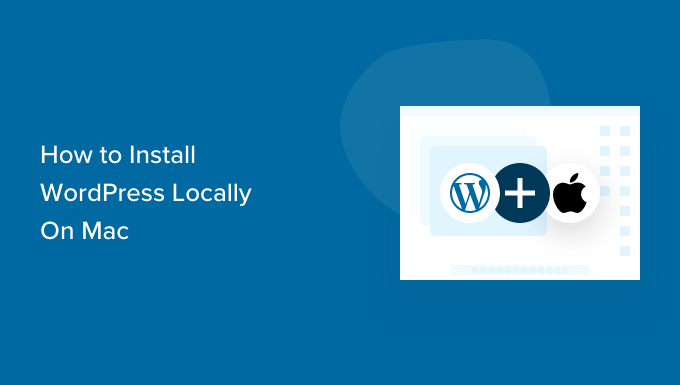
Uwaga: Nie używasz komputera Mac? Mamy również poradnik, jak zainstalować WordPress lokalnie w systemie Windows.
Dlaczego warto zainstalować WordPressa lokalnie na Macu?
Zazwyczaj do stworzenia witryny internetowej WordPress potrzebne jest konto hostingowe i nazwa domeny.
Jednak rdzeń oprogramowania WordPress można pobrać bezpłatnie i uruchomić lokalnie na twoim komputerze. Ta lokalna witryna WordPress nie będzie ogólnie dostępna w Internecie i można ją zobaczyć tylko na twoim komputerze.
Zaletą tego podejścia jest to, że można prywatnie ćwiczyć korzystanie z WordPressa, wypróbować go i zobaczyć, jakiego rodzaju witryny internetowe można tworzyć.
Możesz także użyć tej lokalnej instalacji do przetestowania różnych motywów WordPress i wtyczek przed zainstalowaniem ich na twojej witrynie internetowej.
Czego potrzebujesz, aby zainstalować WordPress lokalnie na Macu?
WordPress jest napisany głównie w PHP, języku programowania po stronie serwera. Do uruchomienia PHP potrzebne jest oprogramowanie serwera WWW i zainstalowany system zarządzania bazą danych MySQL.
Teraz, instalowanie wszystkich tych programów niezależnie i sprawienie, by ze sobą współpracowały, brzmi jak zniechęcające zadanie.
Na szczęście istnieją darmowe narzędzia programistyczne, które sprawiają, że bardzo łatwo jest zainstalować je jako jeden pakiet, nawet dla mniej zaawansowanych technicznie użytkowników. Mając to na uwadze, oto 2 metody na łatwą instalację WordPressa lokalnie na komputerze Mac bez specjalnych umiejętności administrowania serwerem:
Gotowy? Uruchommy WordPressa na twoim komputerze.
1. Zainstaluj WordPress lokalnie na Macu za pomocą Local WP (zalecane)
Local WP to narzędzie programistyczne WordPress, które pozwala łatwo skonfigurować lokalny serwer na twoim komputerze Mac. Możesz również użyć Local na Windows i Linux, aby skonfigurować WordPress.
Najpierw należy przejść na witrynę internetową Local i kliknąć przycisk “Pobierz” w prawym górnym rogu ekranu.
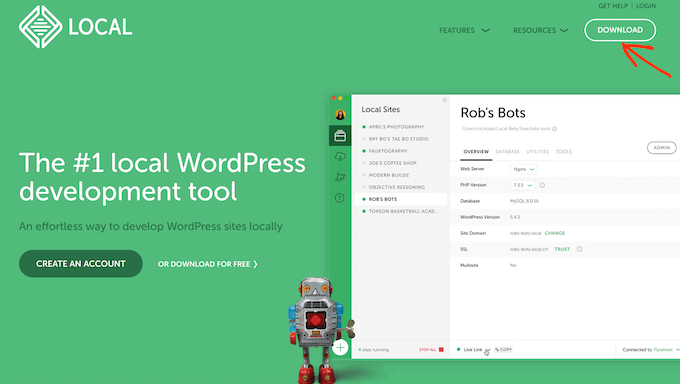
Spowoduje to otwarcie wyskakującego okna Pobierz lokalnie.
Wybierzmy Mac jako twoją platformę.
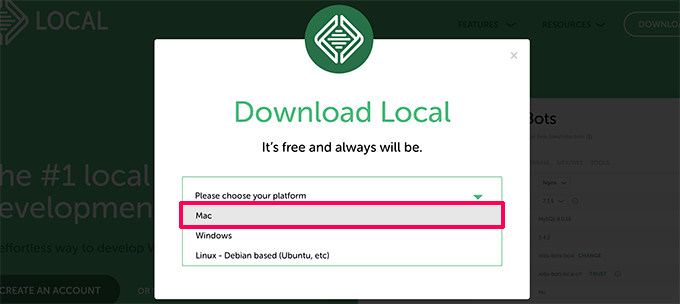
W ustawieniach regionalnych zostaniesz poproszony o wypełnienie krótkiego formularza.
Po wpisaniu twojego imienia i nazwiska, adresu e-mail i numeru telefonu, możesz kliknąć przycisk “Pobierz teraz”.
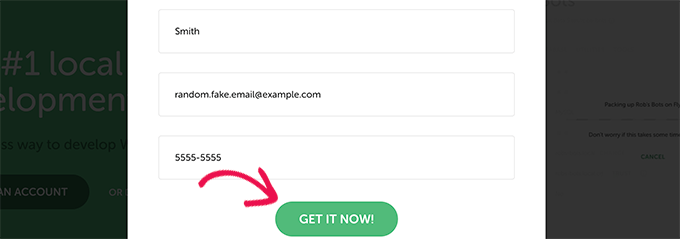
Spowoduje to pobranie regionalnego pliku instalacyjnego na twój komputer. Możesz kliknąć dwukrotnie, aby otworzyć pobrany plik zaraz po zakończeniu pobierania.
Wyświetli się kreator konfiguracji, który poprowadzi cię przez proces instalacji aplikacji Local na twoim komputerze.
Użytkownicy komputerów Mac muszą po prostu przeciągnąć aplikację Local do katalogu “Aplikacje”.
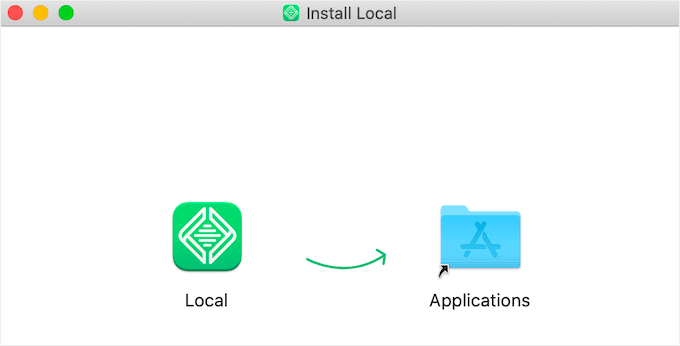
Po zakończeniu instalacji będzie można uruchomić aplikację Regionalne z katalogu Aplikacje.
Przy pierwszym uruchomieniu możesz zostać poproszony o udzielenie odpowiedzi na kilka pytań i utworzenie bezpłatnego konta lokalnego. Kroki te są opcjonalne i możesz je pominąć, jeśli chcesz.
Tworzenie witryny internetowej WordPress w ustawieniach regionalnych
Local sprawia, że bardzo łatwo jest stworzyć lokalną witrynę internetową i szybko zainstalować WordPress.
Aby rozpocząć, wystarczy kliknąć przycisk “Utwórz nową witrynę”.
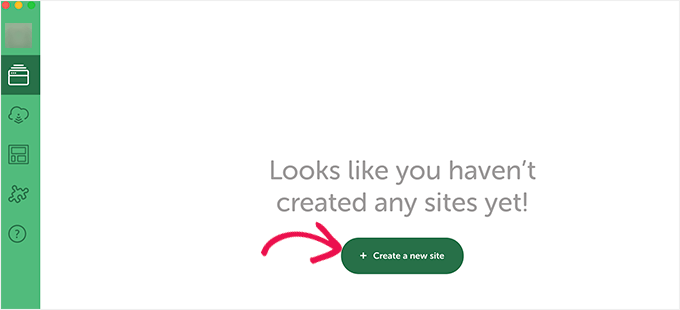
Na następnym ekranie musisz wpisz nazwę twojej witryny.
Następnie kliknij przycisk “Kontynuuj”.

Następnie zostaniesz poproszony o wybranie twojej platformy.
Ustawienia regionalne pozwalają wybrać wersję PHP, Apache i MySQL.
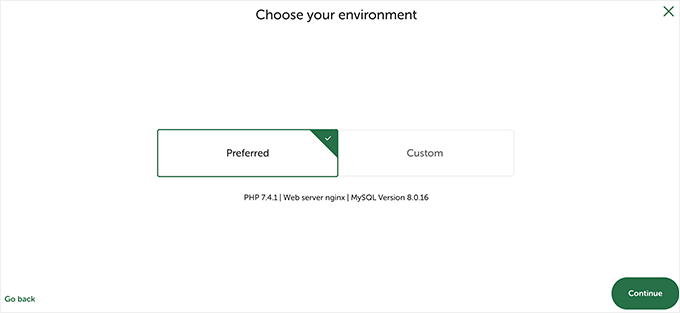
Jeśli nie masz pewności, wybierz ustawienia “Preferowane” i kliknij przycisk “Kontynuuj”.
Na koniec należy wpisz nazwę użytkownika WordPress i hasło. Następnie można kliknąć przycisk “Dodaj witrynę”.
Aplikacja Local pobierze i zainstaluje WordPress, aby utworzyć twoją witrynę internetową. Możesz zostać poproszony o wpisz swojej nazwy użytkownika Mac i hasła, aby wprowadzić zmiany.
Po zakończeniu zobaczysz informacje o Twojej nowo utworzonej witrynie internetowej wraz z przyciskami umożliwiającymi przejście na obszar administracyjny WordPress lub zobaczenie Twojej witryny regionalnej.
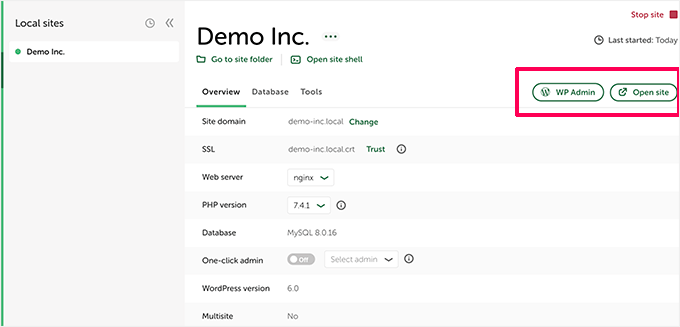
Możesz teraz przejść na swoją witrynę internetową lub logować się do obszaru administracyjnego WordPress.
Z tego miejsca możesz korzystać z Twojej hostowanej lokalnie witryny WordPress tak, jak zarządzałbyś witryną na żywo.
Możesz zainstalować wtyczki i motywy oraz zaprojektować swoją witrynę internetową według własnego uznania.
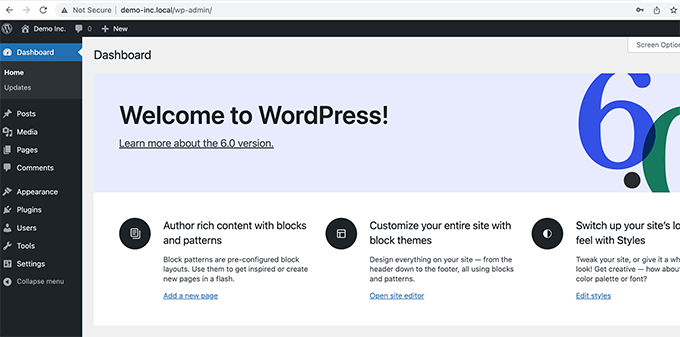
2. Instalacja WordPressa lokalnie na Macu przy użyciu MAMP
MAMP to popularny program, który umożliwia uruchomienie WordPressa na twoim komputerze Mac.
Najpierw przejdźmy na witrynę internetową MAMP. Tutaj powinieneś zobaczyć najnowszą wersję MAMP i MAMP Pro.
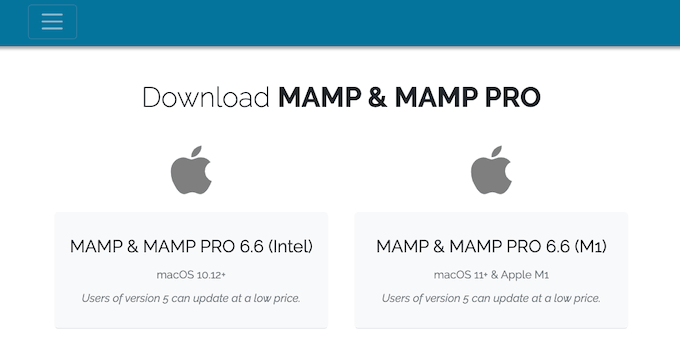
MAMP ma oddzielne pliki do pobrania dla różnych wersji systemu operacyjnego macOS.
Nie masz pewności, która wersja systemu macOS jest zainstalowana na twoim komputerze? Aby się tego dowiedzieć, wystarczy kliknąć ikonkę Apple na pasku narzędzi twojego komputera.
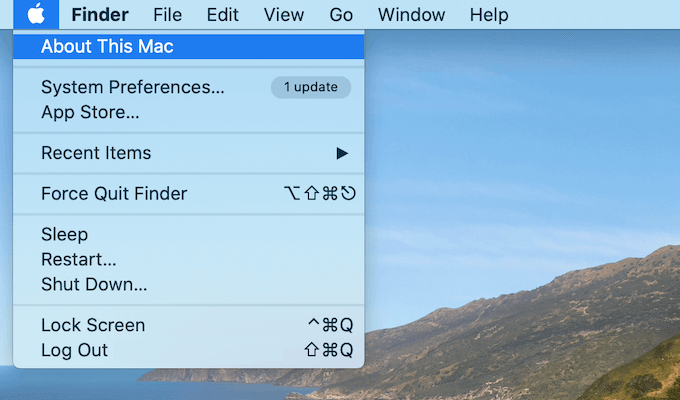
Następnie możesz kliknąć opcję “About This Mac”.
Spowoduje to wyświetlenie wyskakującego okienka z wieloma informacjami o twoim komputerze, w tym o wersji systemu macOS.
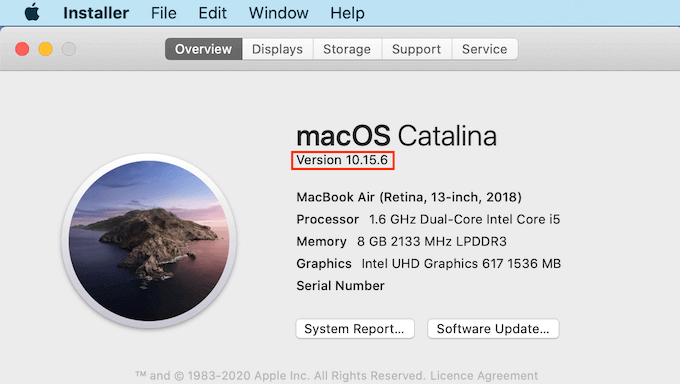
Możesz teraz pobrać odpowiednią wersję MAMP dla twojego systemu operacyjnego.
Po zakończeniu twojego pobierania, kliknij dwukrotnie na plik MAMP .pkg. Spowoduje to uruchomienie instalatora MAMP.

Teraz wystarczy postępować zgodnie z instrukcjami wyświetlanymi na ekranie, aby zainstalować MAMP.
Po zainstalowaniu tego programu, uruchom MAMP, otwierając katalog “Aplikacje” na twoim komputerze.
Tutaj znajdziesz 2 wersje MAMP. MAMP Pro jest wersją płatną, więc upewnij się, że wybrałeś wersję darmową.
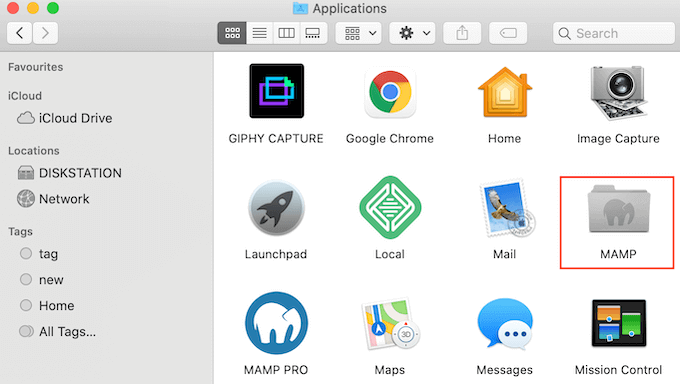
Wewnątrz tego katalogu MAMP znajdują się różne pliki oraz aplikacja MAMP.
Wystarczy kliknąć dwukrotnie, aby uruchomić aplikację MAMP.
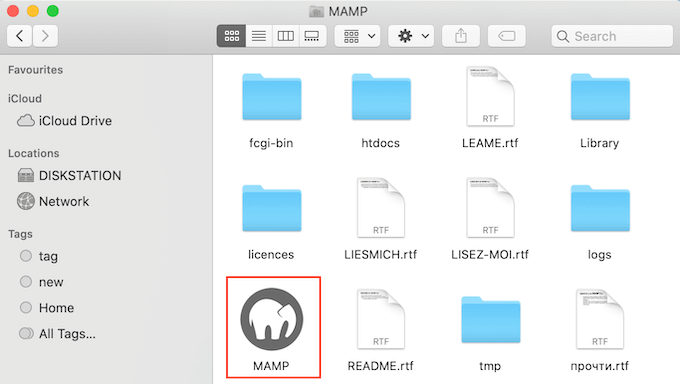
Zanim zaczniesz, zalecamy skonfigurowanie kilku ustawień, aby poprawić twoje wrażenia z korzystania z MAMP.
Aby wprowadzić te zmiany, kliknij “MAMP” na twoim pasku narzędzi, a następnie wybierz “Preferencje….”.
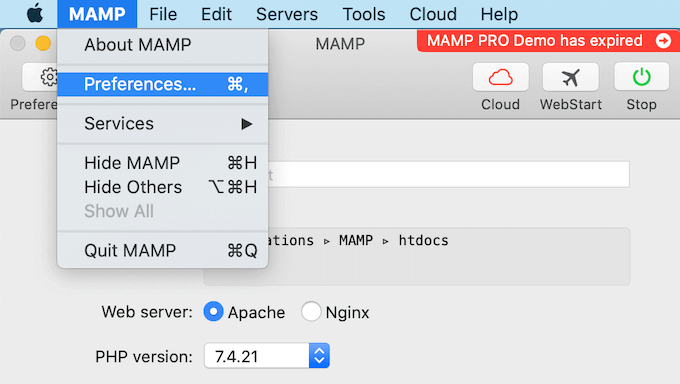
W wyskakującym okienku będziesz chciał przełączyć się na kartę “Porty”.
Możesz teraz sprawdzić, którego portu Apache używa MAMP. Zalecamy przełączenie na port Apache 8888, jeśli MAMP jeszcze go nie używa.
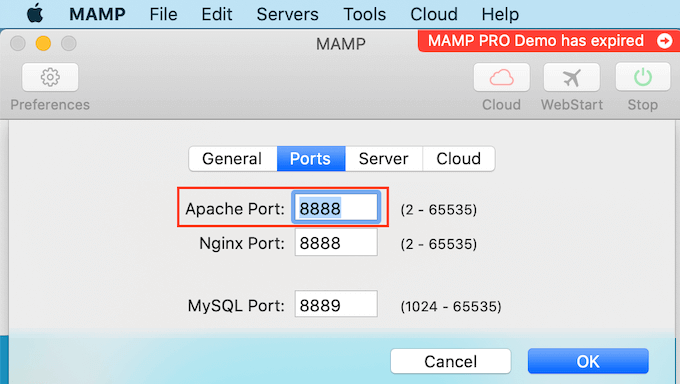
Następnym krokiem jest skonfigurowanie twojego katalogu głównego dokumentów. To tutaj będziesz tworzyć i przechowywać wszystkie swoje lokalne witryny internetowe WordPress.
Domyślnie MAMP używa katalogu /Applications/MAMP/htdocs/, ale można to zmienić na dowolną inną lokalizację.
W oknie dialogowym “Preferencje…” kliknijmy kartę “Serwer”. Twój główny dokument powinien być teraz widoczny.
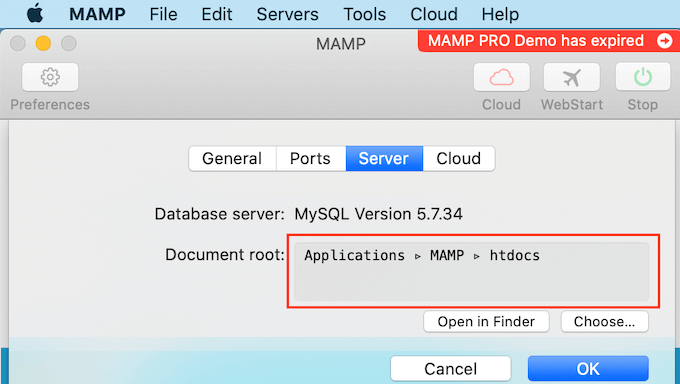
Aby przechowywać twoje witryny w dowolnym innym katalogu, kliknij przycisk “Wybierz…”.
Spowoduje to otwarcie wyskakującego okienka, w którym można wybrać nową lokalizację. Możesz również utworzyć nowy katalog do przechowywania wszystkich twoich witryn internetowych WordPress.
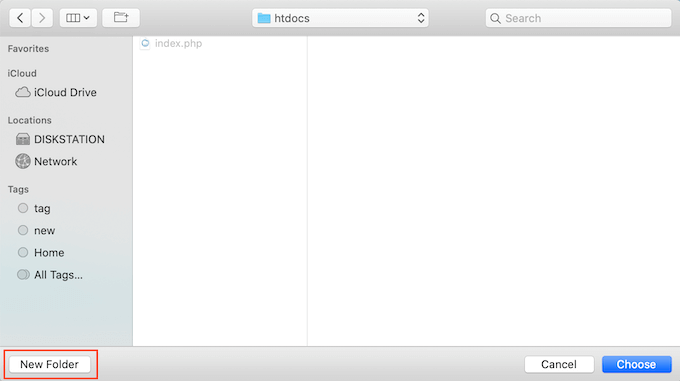
Możesz nadać temu katalogowi dowolną nazwę.
W tym artykule będziemy przechowywać nasze witryny internetowe w katalogu o nazwie “allwebsites”.
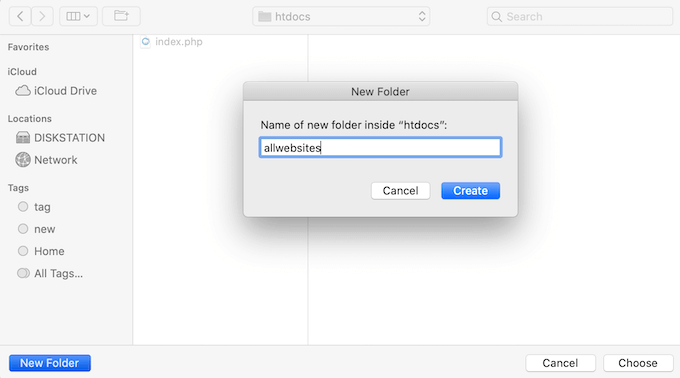
Instalacja WordPressa na MAMP
Teraz, gdy już skonfigurowałeś MAMP, nadszedł czas, aby zainstalować WordPress na twoim komputerze Mac.
Najpierw należy przejść na witrynę internetową WordPress. org i pobrać najnowszą wersję WordPress Core.
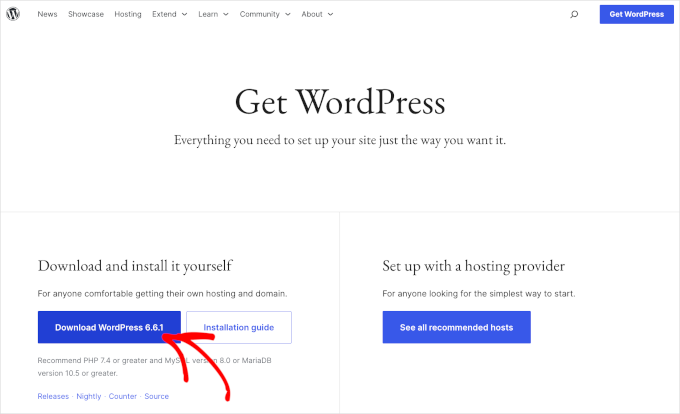
UWAGA: Istnieją dwie wersje WordPress. Aby uzyskać więcej informacji, zobacz nasz artykuł porównawczy na temat WordPress.com vs WordPress.org.
Po pobraniu pliku ze strony WordPress.org wystarczy go rozpakować. Spowoduje to utworzenie rozpakowanego katalogu “wordpress”.
Teraz po prostu skopiuj ten katalog do twojego katalogu głównego dokumentów MAMP.
Ponieważ zmieniliśmy katalog główny dokumentów, musimy skopiować “wordpress” do applications/MAMP/htdocs/allwebsites.
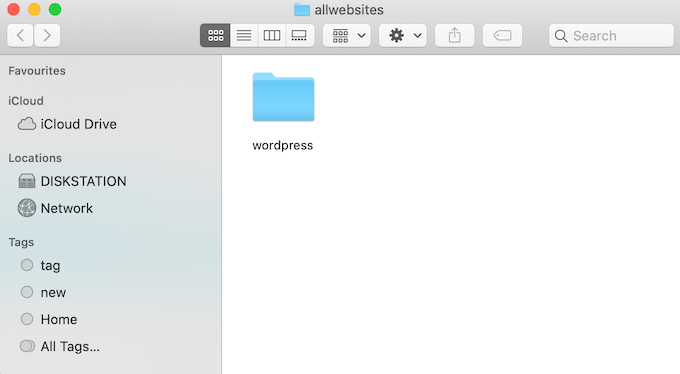
WordPress potrzebuje bazy danych do przechowywania wszystkich swoich treści i danych. Musisz utworzyć tę bazę danych przed utworzeniem regionalnej witryny internetowej.
Nie martw się – nie jest to tak trudne, jak się wydaje.
W oknie MAMP “Preferencje…” wystarczy kliknąć przycisk “OK”. Powinno to uruchomić aplikację MAMP w nowej karcie przeglądarki.
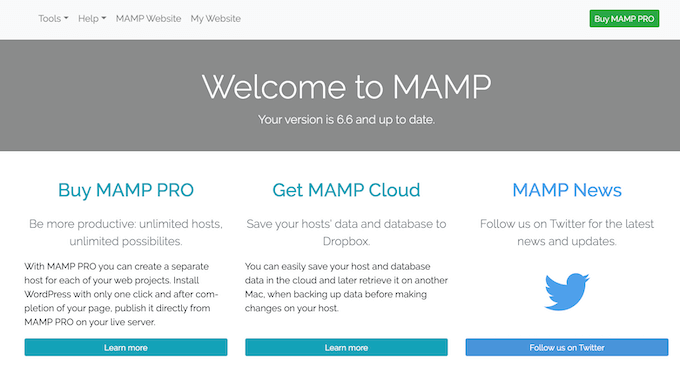
Twoim kolejnym zadaniem jest uruchomienie phpMyAdmin. Jest to aplikacja internetowa służąca do zarządzania bazą danych MySQL twojej witryny.
Na pasku narzędzi przejdźmy do Narzędzia ” phpMyAdmin.
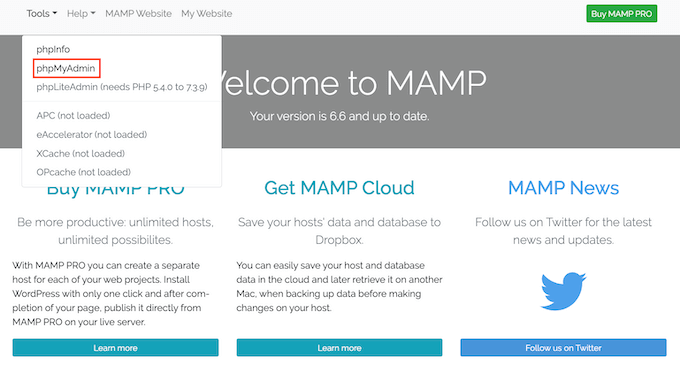
Spowoduje to otwarcie phpMyAdmin w nowej karcie.
W kokpicie phpMyAdmin należy przejść do karty “Bazy danych”.
Możesz teraz wpisać dowolny rodzaj nazwy twojej bazy danych w polu “Nazwa bazy danych”. Pamiętaj tylko, aby zapamiętać nazwę, ponieważ będziemy jej używać w następnym kroku.
Na potrzeby tego poradnika nazwiemy naszą bazę danych “test_db”.
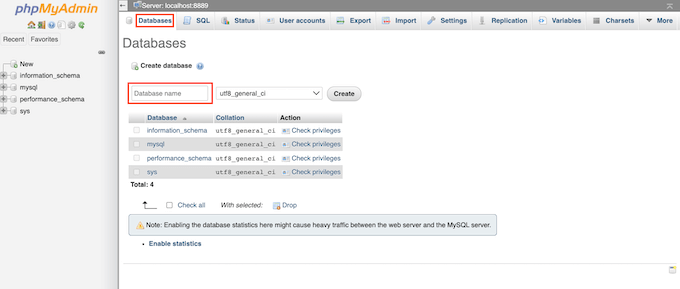
Po wpisaniu nazwy twojej bazy danych możesz kliknąć przycisk “Utwórz”.
PhpMyAdmin utworzy wtedy twoją bazę danych.
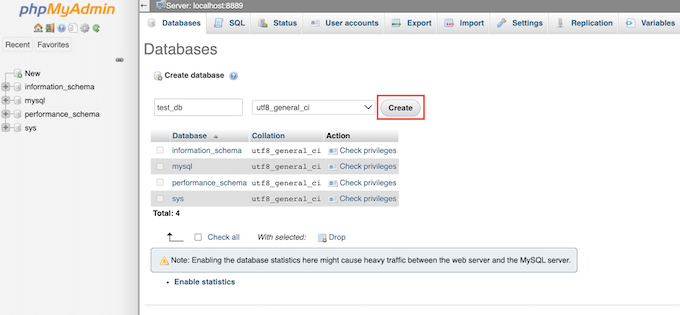
Teraz nadszedł czas na zainstalowanie WordPressa.
W nowej karcie przeglądarki wystarczy przejść na stronę http://localhost:8888/. Jeśli używasz innego portu niż 8888, po prostu zmień adres URL, aby wspomnieć o twoim porcie.
Powinieneś teraz zobaczyć odnośnik do folderu “wordpress”, który skopiowałeś do głównego katalogu dokumentów. Kliknij ten odnośnik. Spowoduje to otwarcie kreatora instalacji WordPress.
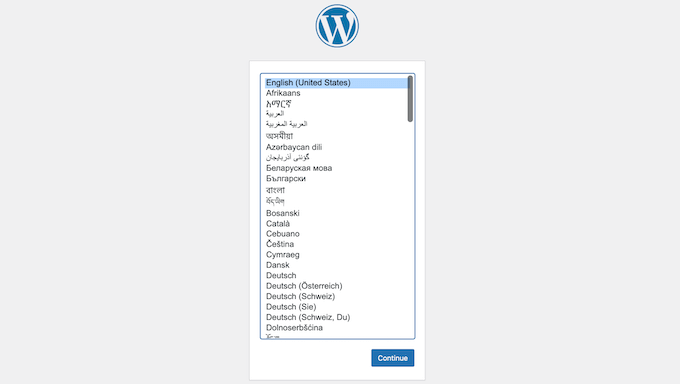
Kreator instalacji WordPress rozpoczyna się od prośby o wybranie języka. Po dokonaniu twojego wyboru możesz kliknąć przycisk “Kontynuuj”.
Na następnym ekranie WordPress wyświetli listę wszystkich informacji potrzebnych do ukończenia instalacji.
Po zapoznaniu się z tym ekranem, kliknij przycisk “Przejdźmy dalej”, aby przejść dalej.
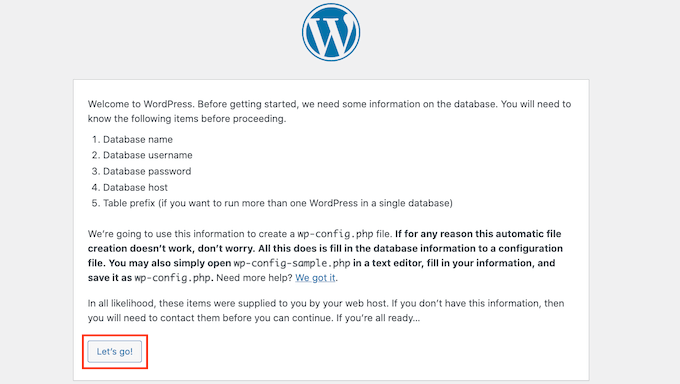
Kreator konfiguracji poprosi teraz o podanie informacji o twojej bazie danych WordPress. Jako nazwę bazy danych wystarczy wpisać nazwę utworzoną w poprzednim kroku.
W polu “Nazwa użytkownika” i “Hasło” wystarczy wpisać rodzaj “root”.
Następnie możesz wpisać “localhost” w polu “Host bazy danych”. Localhost oznacza, że baza danych i witryna internetowa są hostowane na tym samym serwerze, którym w tym przypadku jest twój komputer Mac.
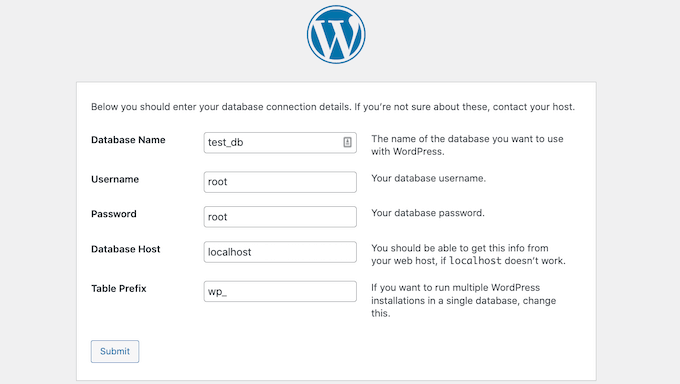
Po wpisaniu wszystkich tych informacji wystarczy kliknąć przycisk “Wyślij”.
WordPress połączy się teraz z twoją bazą danych i utworzy dla ciebie plik konfiguracyjny. Po zakończeniu zobaczysz komunikat o powodzeniu.
Aby przejść do następnego kroku, możesz kliknąć przycisk “Uruchom instalację”.
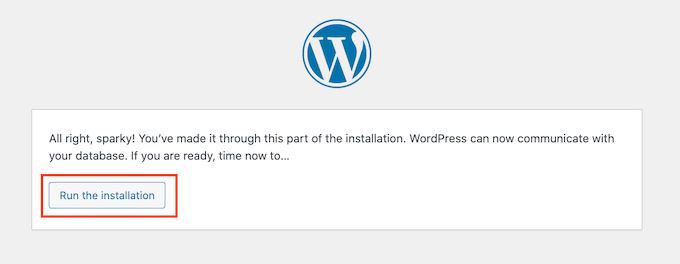
Na następnym ekranie WordPress poprosi o dodanie tytułu witryny. Możesz na przykład użyć nazwy Twojej firmy. Większość motywów WordPress wyświetla ten tytuł na samej górze twojej witryny internetowej.
Jeśli nie masz pewności co do tytułu twojej witryny, nie ma powodu do paniki. Możesz zmienić tytuł w twoim kokpicie WordPress w dowolnym momencie.
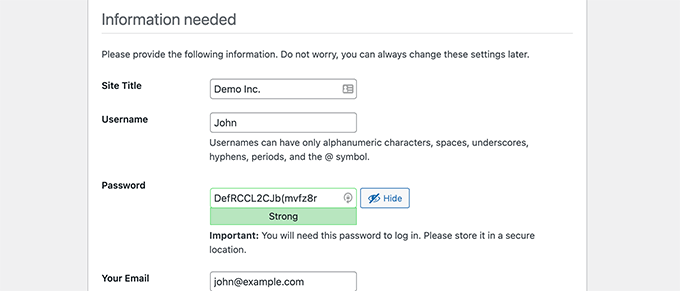
Następnie należy utworzyć nazwę użytkownika i hasło. Są to dane logowania, których będziesz używać, aby uzyskać dostęp do twojego kokpitu WordPress.
Możesz również wpisać swój adres e-mail w polu “Twój e-mail”. Jest to adres, na który WordPress będzie wysyłać wszystkie e-maile od administratorów.
Po wypełnieniu formularza kliknij przycisk “Zainstaluj WordPress”.

WordPress uruchomi teraz instalację.
Po kilku chwilach powinieneś zobaczyć komunikat “Sukces!”.

Aby przejść bezpośrednio do twojego ekranu logowania WordPress, kliknij przycisk “Loguj się”.
Możesz również logować się do swojej regionalnej witryny internetowej WordPress, korzystając z następującego adresu URL: http: //localhost:8888/wordpress/wp-login.php.
Uwaga: Jeśli używasz innego portu Apache, musisz zmienić część “8888” tego adresu URL.
Możesz teraz zalogować się do swojej witryny WordPress, wpisz nazwę użytkownika i hasło utworzone w poprzednim kroku.
Spowoduje to przejście do kokpitu WordPress.
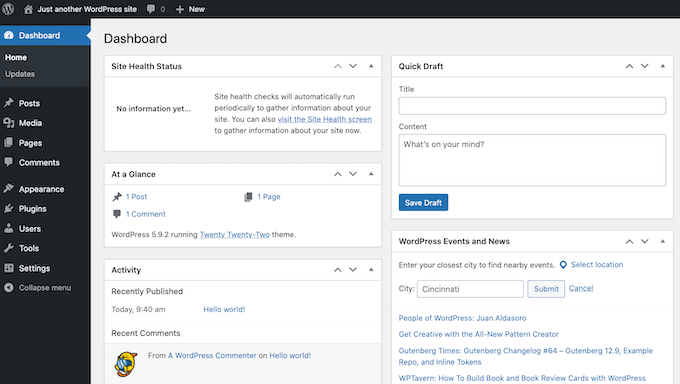
Wypróbowanie WordPressa lokalnie na Macu
Instalacja lokalna jest idealna do testowania WordPressa lub tworzenia witryn internetowych na twoim komputerze. Teraz, gdy WordPress działa lokalnie na twoim Macu, oto kilka rzeczy, które możesz chcieć wypróbować:
- Eksperymentuj z najlepszymi motywami WordPress.
- Spróbuj znaleźć swój idealny motyw WordPress.
- Przetestuj niezbędne wtyczki WordPress lokalnie.
- Naucz się programowania WordPress, tworząc własne wtyczki i dostosowane motywy.
Przeniesienie twojej regionalnej instalacji WordPress do witryny internetowej na żywo
Gdy już pobawisz się WordPressem lokalnie, możesz chcieć przenieść twoją instalację WordPressa do witryny internetowej na żywo. Tylko w ten sposób inni będą mogli zobaczyć twoją witrynę internetową.
Aby to zrobić, musisz kupić nazwę domeny i hosting.
Nazwa domeny to adres Twojej witryny internetowej w Internecie, a hosting to miejsce przechowywania plików witryny. Możesz myśleć o hostingu internetowym jako o domu Twojej witryny internetowej w Internecie.
Jeśli chodzi o hosting, polecamy Bluehost. Jest to jedna z największych firm hostingowych na świecie, która jest również oficjalnie rekomendowana przez WordPress.org.
Na szczęście Bluehost oferuje użytkownikom WPBeginner zniżkę na hosting, darmowy certyfikat SSL i darmową nazwę domeny. Zasadniczo możesz przekształcić swoją lokalną instalację WordPress w witrynę internetową za 1,99 USD miesięcznie.
Po zakupie hostingu warto zapoznać się z naszym artykułem na temat przenoszenia WordPressa z serwera lokalnego na witrynę internetową.
Mamy nadzieję, że ten artykuł pomógł ci dowiedzieć się, jak zainstalować WordPressa lokalnie na Macu. Następnie możesz również zapoznać się z naszym przewodnikiem na stronie , jak stworzyć witrynę internetową z WordPressem lub zobaczyć nasze porównanie najlepszych zarządzanych firm hostingowych WordPress.
If you liked this article, then please subscribe to our YouTube Channel for WordPress video tutorials. You can also find us on Twitter and Facebook.





Robin
Hello,
I tried to follow this tutorial but got stuck when I had to go to the localhost
I changed to root in MAMP… my browser returns an empty white page
I don’t understand what the localhost stands for (is it the root on my MacBook or is it the root that I set during the setup of MAMP ?
WPBeginner Support
It is the URL that MAMP sets up to go to the folder on your site and properly load your site. If you changed the address for MAMP then you would need to go to that updated address.
Admin
Henry Barnett
I pop the URL Desktop/Wp_docs/vh_website into a new browser tab and ‘This site can’t be reached’. Can you please help?
WPBeginner Support
You would want to try reaching it using http://localhost
Admin
Sop
Thank you for this tutorial! I have successfully installed MAMP and have WordPress running locally. I’ve played around with it but would like to delete it now because I won’t be using WordPress anymore. What is the best way to do this?
WPBeginner Support
You could uninstall MAMP and delete the folder with your site information.
Admin
Lola
If localhost/mysite didnt work for you, check that you MAMP is running then click Webstart > My Webiste > Language and so on.
Thank you for the post,
WPBeginner Support
Thank you for sharing what helped you ensure the site was active
Admin
Russell
Having set up on my desktop (thank you so much!) and begun to build, I was trying to transfer everything to my laptop by copying the MAMP folder and the Mysite folder with all the WordPress files to the exact same places as my desktop. But I am unable to get it to work after a good few hours trying to figure a way through.
WPBeginner Support
For transferring your local installation, you would want to follow the steps in our guide below for properly transferring your content:
https://www.wpbeginner.com/wp-tutorials/how-to-move-live-wordpress-site-to-local-server/
Admin
Simon Miles
Nope, doesn’t work if you don’t understand computer science. This bit here – Go to localhost/mysite in a new browser tab. If you re-named the wordpress folder to something else, then use that name here – requires more explanation. I have no idea what to type in the browser.
WPBeginner Support
If you did not name the folder where you placed the WordPress files ‘mysite’ then you would replace the mysite in the URL with the name of the folder you decided to use.
Admin
kpatterson
I am running into an issue with the WordPress Installation Wizard on my browser, nothing is loading its just a blank screen, there are no errors displayed. Any advice?
WPBeginner Support
You would want to ensure MAMP is running and if it is to then use the debug option from our article below:
https://www.wpbeginner.com/wp-tutorials/how-to-fix-the-wordpress-white-screen-of-death/
Admin
jeania
I am having the same problem, how do you make sure that MAMP is running?
WPBeginner Support
You would open the MAMP program and if it gives the option to turn off your server then MAMP is running.
Admin
Geoff
wow, after 3 days messing around with other instructions I followed these and bingo I have wordpress running on de mac. Thank you.
WPBeginner Support
Glad our guide was helpful
Admin
Jennifer
Success! Thank you for these instructions. It took a little trial and error a few times, but I ultimately figured it out. One thing that tripped me up for a while was that apparently I needed to click on “start servers” in MAMP before the “Open web start page” would allow me to click on it. I didn’t see that anywhere in the instructions, so maybe that will help someone else. Thanks again! Onward with playing around with WordPress
WPBeginner Support
Thanks for sharing what helped you
Admin
nandhini
Thanks it helped me
Imran
The wordpress page was not opening on my Mac… then i changed localhost port setting back to 8888… and then it worked
WPBeginner Support
Glad you were able to find a solution that worked for you
Admin
Mel
Thank you for the very helpful article! Other articles were not up to date and the links to other articles at the end are useful
WPBeginner Support
Glad our article was helpful
Admin
sumeet
can we monetize the wordpress blog if we are hosting through MAMP
?
WPBeginner Support
Normally no as MAMP is for creating a local installation
Admin
Wendy
I managed to install wordpress finally and logged in, but once everything is closed and I want to get back to my local wordpress site, how do I access it? I feel like a total ditz right now…lol
WPBeginner Support
You would visit the localhost address you visited before and ensure MAMP is running before you try to visit the address
Admin
Elliott
How do you fix this issue? I see this when trying to access wordpress admin area
This page isn’t workinglocalhost is currently unable to handle this request.
HTTP ERROR 500
WPBeginner Support
There are a few different reasons, you may want to start with following our guide below:
https://www.wpbeginner.com/wp-tutorials/how-to-fix-the-internal-server-error-in-wordpress/
Admin
jane
i got half way then when it said to type in http localhost/mywebsite it didnt work
WPBeginner Support
You would want to ensure MAMP is running for the most common reason for that issue.
Admin
John
Thanks for the tutorial. Just one thing I’d like to mention… changing the default location of htdocs to one in my documents folder meant MAMP didn’t work. Changed it back to applications > MAMP > htdocs and it worked.
WPBeginner Support
Thanks for sharing this in case others ran into this issue or this is a change to MAMP since the last update of this article
Admin
Marianne
Thanks for sharing. I had the same problem.
Jen Harrigan
Thanks for the help, you are a lifesaver!
WPBeginner Support
You’re welcome, glad our guide could be helpful
Admin
Willy
When I put localhost/mysite in browser, I changed the folder´s name to wordpress_beginner so I put
localhost/wordpress_beginner in browser, but get error can´t find it??
WPBeginner Support
You may want to start by trying localhost and if that is not displaying correctly then you would want to ensure MAMP is running and does not have any errors.
Admin
Anjana
I copy the worpress folder to mamp folder and rename that folder with mysites name. When I try to run localhost:8888/mysites it gives
The requested URL /mysites/index.php was not found on this server.
Please help me
WPBeginner Support
Just in case, you would want to ensure MAMP is running when you try to visit the local installation
Admin
A
I get to the point of “Simply click on the Open Web Start Page button in MAMP application window”, but this option is greyed out and unclickable.. any thoughts on why this might be?
WPBeginner Support
One of the services may not be running correctly, in the tip right of the MAMP window there should be icons for each service with a green dot, if one of those isn’t green then that service could be the root of the issue.
Admin
Joanna Ma
I followed all the steps up until the installment, but I can’t open my http:localhost page, it just says error or unable to open on my screen. I’m not sure where I’m going wrong here, please let me know what else I should try!
WPBeginner Support
If you’ve come back after restarting your computer you would want to ensure MAMP is running so the local install can be found
Admin
Eva Giddings
Hey there, I have downloaded WordPress and created a database, but when I type localhost/mysite into the address bar it gives me a 404 not found error.
I just kept /Applications/MAMP/htdocs/ as my root folder, and I renamed the wordpress file to mysite. right now the wordpress folder is in htdocs, is that where it’s supposed to be?
WPBeginner Support
That all looks correct, are you certain MAMP is running before you tried to visit that address?
Admin
Dan
How do I restart WP on my mac to continue working on my site, I can’t find any info on how to do that.
Thanks,
Dan
WPBeginner Support
You would need to run MAMP again for the site to be findable at the address if that is what you mean.
Admin
Andrew
Wow. SUPER COOL and kind of you to take the time to post. This website is fantastic. THANK THANK THANK YOU!
WPBeginner Support
Thank you, glad you like our guide
Admin
Rick Karlson
I got to the point where you instructed to copy the WordPress to the MAMP Document root folder, AND you gave not a clue as to just where that might be found on my mac mini.
I dug through the MAMP files and folders (post install) and can find nothing like you reference. My opinion is your instructions are, without this small piece of info, useless.
WPBeginner Support
Some users may have changed where it is installed but normally you should see your MAMP folder in your Applications folder.
Admin
Joan Houston
So the “MAMP Document root folder” refers to the MAMP folder that got installed in the Applications folder? I, too, am confused by this.
WPBeginner Support
Correct
Peter Fritz Walter
Thanks for this comprehensive tutorial, it was very useful to me.
Peter
WPBeginner Support
Glad our guide could be helpful
Admin
Carrie
Oops! Looks like MAMP isn’t free anymore. I get as far as “Open WebStart Page” only to be directed to the website to purchase.
WPBeginner Support
From taking a look, they bundled the pro and free versions together. You should still be able to run MAMP for free
Admin
Tabish Hyyat
Hey! Kindly update the article….can’t work out which thing is which……
anurag
thanks , it is really helpful
Oleg
Thanks! Worked well.
Andrea
Hi, thanks for the great post! I have MAMP installed since a WordPress training I took suggested it. Does having MAMP serve as a localhost for testing my site serve the same purpose as using a subdomain as a staging site? I’ve read your articles on the latter, and am trying to understand. I guess one difference would be that if I used the MAMP method, I would always have to use my Mac; if I used a subdomain and just made it private, I could test from any computer. Am I thinking of this correctly? Basically, I am a beginner planning to start a blog, and want to make sure I have a testing environment. Thanks!
WPBeginner Support
Hi Andrea,
Yes, using MAMP you can create websites on localhost. These websites will only be accessible only on your computer. A staging website is on a live server that can be accessed using any computer.
Admin
Stan
Be aware that with MAMP 4.1.1 and PHP 7.1.1, you will see phpMyAdmin grayed out. The solution is to go into MAMP click the PHP tab and change PHP to 7.0.15. Presto !
By default MAMP shows only two versions of PHP , so if you don’t see 7.0.15 on list then rename folders with PHP versions you don’t want to use in the Applications/MAMP/bin/php folder.
Tara
I have changed the database charset in creating database tables, now I can not view my wepage or even in wp-admin. How do you find the database names from MAMP on a mac to change the database name back? Thanks
Fannie
When I’m in “phpMyAdmin”, I don’t see the tab “databases”, neither all the other options in the menu. I just see a table (grey and purple)… Someone know what I did wrong ?
Laura
Is there a newer version of this tutorial to go along with the current version of MAMP? The screenshots here are very different. Also, the instructions to create the document root aren’t very clear – first you advise putting it in a new folder in the Documents folder (which I did), but then you make it seem like it’s supposed to be in the MAMP folder in the Applications folder! I can’t get my localhost page to come up… This is my folder tree thingy…
Macintosh HD\Applications\MAMP\htdocs\WEBSITES\name\wordpress
What should my localhost address be?
I’ve also tried putting the WordPress folder here…
Macintosh HD\users\me\documents\WEBSITES\name\wordpress
I’m very confused.
BP
From the MAMP webpage click “my website”, 2nd from the left on the menu.
That will take you to the localhost site.
lisa
were you able to find a new tutorial?
Apoorv
This is so helpful..!! Worked like a Charm.
Charles Bewlay
I installed everything – brilliant – and was working on installing a template from template vendor. It asked to select a Cherryframework zip file. I did and then everything went blank. I’ve not been able to see anything since. I realised I had selected the wrong Cherryframework file – not the one in the template folder but one from outside that I had downloaded earlier and just had in my “new website’ folder.
I don’t really want to have to start from scratch. when I look at all my previous history I just get blank white pages.
Help!
Charles Bewlay
Many thanks guys, couldn’t have gone anywhere without you
Ed
I’m developing WordPress sites locally and then move it to a live server when i’m done. But when i start new projects locally I don’t really know how to handle the old files from previous work and databases?? Shall I just delete database, files and everything and start again??
Michael
Okay, so I setup my wordpress page using MAMP on my mac a few weeks ago and it was working and I was able to use edit the content. But going back to it now, I can’t seem to edit, just view my page. I start MAMP, go to the ‘WebStart Page’, click ‘My Website’ from the menu bar and choose my page. It loads, but I don’t see how I get to the WordPress editor??
Please help…
WPBeginner Support
We hope you have tried accessing your website’s admin area by visiting the URL:
http://localhost/wp-admin
This URL may differ depending on how you installed WordPress. Let’s suppose you installed it in a folder mysite, then your login URL would be.
http://localhost/mysite/wp-admin
Also check our guide on how to find your WordPress login URL.
Admin
Carolyn
It is unclear where to create the file below. I did not see this in MAMP or in the new window. If you are going to take people step by step in doing something, you need to be CLEAR!
Open a new browser window and type http://localhost/mysite. If you re-named the wordpress folder to something else, then use that name here. WordPress will notify you that it was unable to find wp-config.php file.
Click on Create a Configuration File button.
Create a Configuration file for WordPress in MAMP on Mac
M L Williams
I have everything installed and working, only I followed other instructions and didn’t use port 80. Plus I ended up using the default site htdocs inside Applications.
Is there a way I can have a do over, and reinstall everything the way you say to. I cannot may my site multisite, which was the whole reason I went down this rabbit hole.
Thanks so much for the article. It is well written and very helpful, just what I was looking for. Just wish I had found it first.
WPBeginner Support
Yes you can uninstall MAMP by simply visiting the Applications in Finder and then deleting MAMP.
Admin
Dee
Just wondering – what is the whole point of installing this on a MAC if we can work through the WordPress website? I’m trying to understand if I should bother downloading this onto my MAC or if it’s ok to just work through the regular website. Thanks.
Elisabeth Howlett
Very Helpful Article, from grateful person thinking that I would NOT be able to pull off MAMP then WordPress install. I actually did it!!!
Claire
I’m having issues where i don’t get the option to ‘Create a Configuration File’. I have the WordPress database information window first, then I get an error ‘Error establishing a database connection’ screenshot below – but no option to create configuration.
Am I doing it wrong? Any help would be greatly appreciated.
Thanks
Gorish Aggarwal
i too am getting the same error. did u find out how to fix it?
Liza
I had the same issue. There was an auto generated DB password in my wp-config.php file, so I changed it to ‘root’ and it worked. Obviously you should change your password after you get everything working.
/** MySQL database password */
define(‘DB_PASSWORD’, ‘root’);
SoHoWebStudio
Thanks for the help folks. 1st time doing this stuff. It helps to have good instructions. Some steps have been automated, but that’s cool. Let’s see how it goes from here. One my way to building my website. Thanks again.
Laura
I installed MAMP and got WordPress running, but for some reason my changes to the CSS aren’t being reflected on the page. At first I thought it was a caching issue, until I realized that it’s reflecting other changes, such as adding an item to the navigation menu. It’s the custom.css file it’s not seeing. (I am using Thesis 1.8.5.) Does it have anything to do with my naming the root folder dev-site instead of htdocs? Also my WP installation is directly inside the root folder, not two levels down. Thanks for any ideas you guys might have.
AM
I had this problem too. First I moved the root document folder from my desktop to ‘my documents.’ Then I changed the root in MAMP. When I ‘opened the start page’ I went to phpLiteAdmin and created a database there. Although wordpress said it couldn’t find the name of the database I had created there (I used the phpMyAdmin database name) I think it still got rid of my 404 error not found.
Tay
Did you guys change the port numbers?
Gaetan
Thanks to you guys I have successfully installed WordPress on my computer. Now I have one more issue :
I already have a live wordpress blog that runs via the online web version of wordpress at wordpress.com.
How can I access the blog I already created via the web version on the version I just installed on my computer?